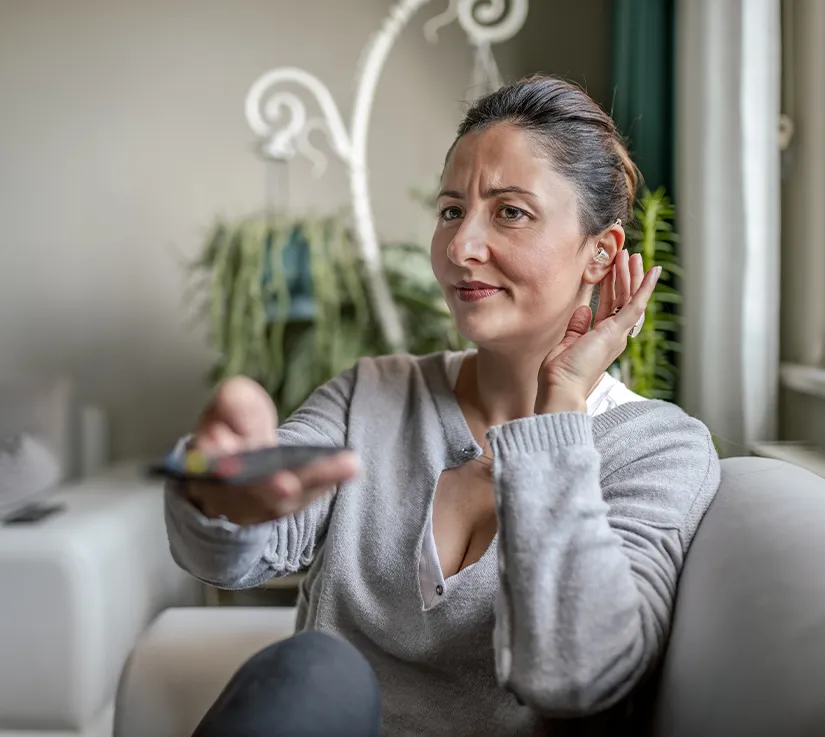Hearing aids help you hear better by making sounds louder and speech clearer. Modern digital devices can also help eliminate background noises and use artificial intelligence (AI) to provide a better sound experience. Our expert audiologists adjust your device for a perfect fit, ensuring your comfort and optimal hearing. At Allergy & ENT Associates, we offer various styles and fits to match your lifestyle.
- Custom Fit for Your Needs – Audiologists ensure your device fits well for maximum comfort and effectiveness.
- Optimized for Sound Quality – Audiologists fine-tune each device to improve speech clarity and reduce background noise. This allows you to hear clearly in various environments.
- Ongoing Support – Allergy & ENT Associates Audiologists offer ongoing care, adjustments and maintenance to keep your device working its best.
- Behind-the-Ear (BTE Hearing Aids) – Sits behind the ear with a small tube connecting to an earpiece.
- Receiver-in-Canal (RIC Hearing Aids) – Smaller and more discreet than BTE.
- Completely-in-Canal (CIC Hearing Aids) – Nearly invisible and custom-molded for a snug fit.
- In-the-Ear hearing (ITE Hearing Aids) – This solution fits snugly in the outer ear.
How Digital Hearing Aids Work
The technology behind your hearing
- Digital hearing aids convert sounds into a digital signal, which is then processed by a computer chip. This allows for more sophisticated sound processing with amplified clarity in one-on-one conversations, noisy group settings and public spaces.
- Modern digital devices filter out background noise for clearer sound in various environments and can adapt to different settings without manual intervention.
- Wireless features and Bluetooth connectivity allow users to stream audio directly from their phone, television and devices while AI helps the device learn your own personal hearing preferences over time.
Your provider will discuss your options and help you choose the best technology for your needs and lifestyle.
Traditional Hearing Aids vs. Osseointegrated Device
Traditional devices work well for many people with hearing loss. However, if you have conductive or mixed hearing loss, your provider may recommend an osseointegrated device instead.
Traditional Hearing Aids
Traditional devices amplify sound and send it through the ear canal. They are best for those with sensorineural hearing loss. They come in various adjustable styles to fit individual needs.
Osseointegrated Hearing Device
An osseointegrated device sends sound vibrations through the skull bone to the inner ear, bypassing the ear canal and middle ear. This option is ideal for those with conductive or mixed hearing loss. It is also recommended for individuals who cannot wear traditional devices due to ear canal issues.

We Hear You.
Hearing aids are designed with your convenience in mind. At Allergy & ENT Associates, we aim to provide you with lasting results, better hearing and a higher quality of life. Let us help you reconnect with the sounds around you and the people you love.
What to Expect
At Allergy & ENT Associates, we provide professionally fitted hearing aids hearing aids to treat your hearing loss. Your provider will assess your hearing and help you choose the best device for your lifestyle and preferences.
Your individualized treatment plan for hearing aids begins with a selection appointment. The process includes a one-hour fitting appointment in which your devices will be programmed to your hearing loss for optimal sound quality. You will have scheduled follow-ups to ensure your adjustment period goes smoothly. Over time, adjustments may be needed. This is completely normal; our team will ensure your device always works its best.
Hearing Aids For Children
Hearing aids are a safe and effective option for children with mild to severe hearing loss. An audiologist will ensure a comfortable environment for testing and fitting. Pediatric devices are durable, comfortable and designed to grow with your child.
If your child has frequent ear infections, speech delays or trouble responding to sounds, a hearing evaluation can help determine the best solution.
